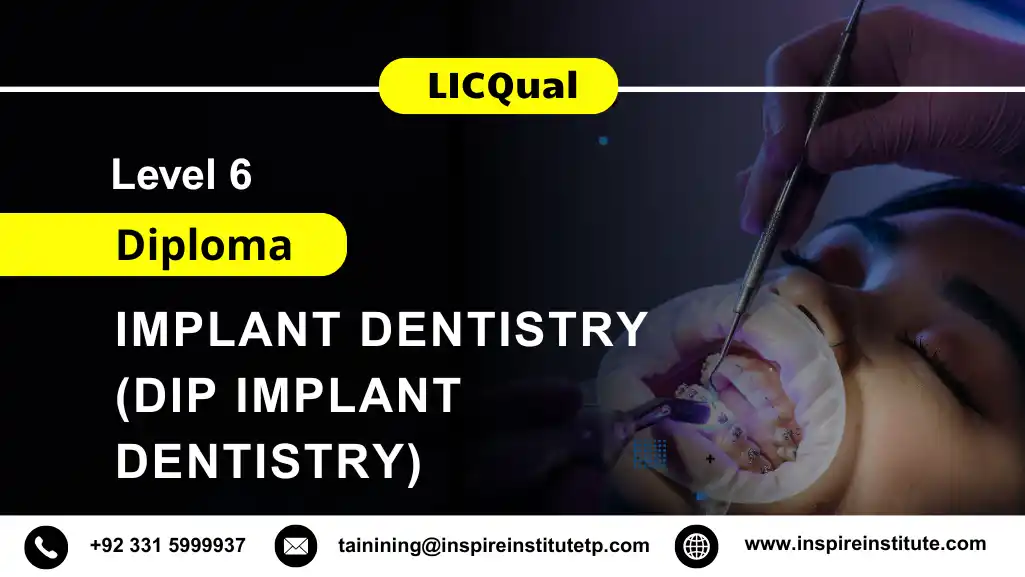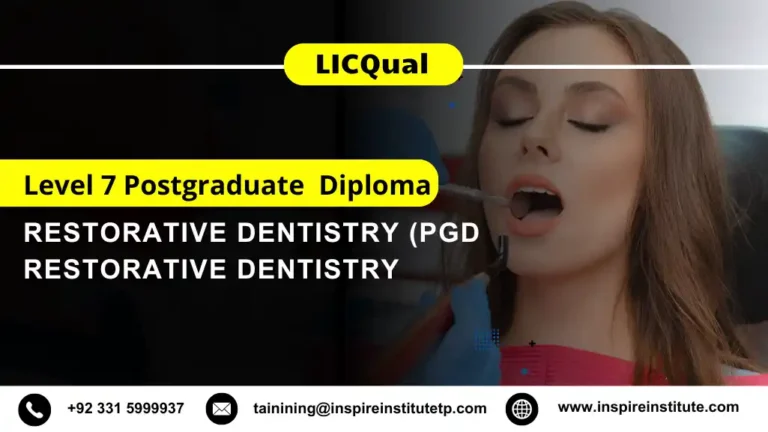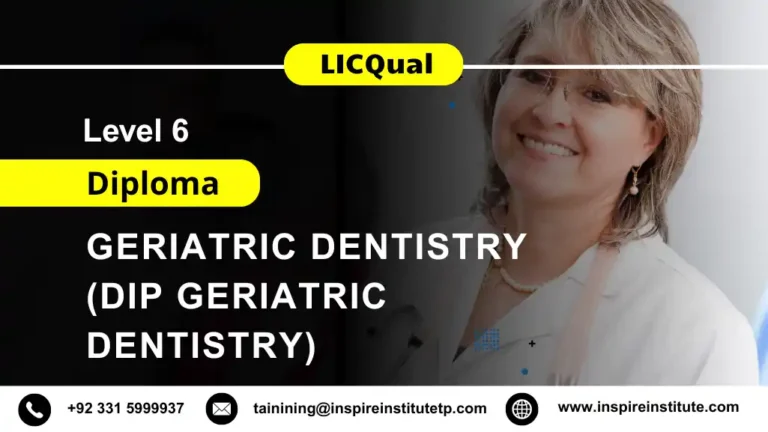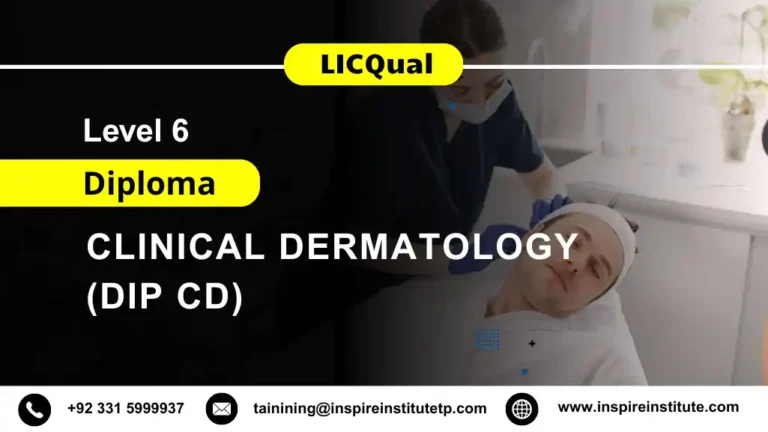LICQual Level 6 Diploma in Implant Dentistry (Dip Implant Dentistry)
The LICQual Level 6 Diploma in Implant Dentistry (Dip Implant Dentistry) is a UK-accredited qualification designed for dental professionals seeking to advance their expertise in modern implantology. Dental implants are now one of the most effective and in-demand treatments for restoring oral function and aesthetics, making this diploma essential for practitioners aiming to expand their clinical skills. This comprehensive programme blends advanced theory with clinical application, ensuring learners can deliver safe, evidence-based implant treatments that meet the growing needs of patients worldwide.
The purpose of the LICQual Level 6 Diploma in Implant Dentistry is to provide dental professionals with a strong academic and clinical foundation in implantology. Participants will gain in-depth knowledge of implant design, bone biology, osseointegration, and surgical protocols. By mastering these principles, learners will be prepared to plan and execute implant treatments confidently, while adhering to international standards of clinical excellence. This makes the diploma an ideal pathway for those looking to progress in restorative and surgical dentistry.
A key feature of this programme is its emphasis on practical application in implant dentistry. Learners explore advanced techniques in implant placement, bone grafting, sinus lifts, soft tissue management, and implant-supported prosthetics. The course also covers patient assessment, diagnostic imaging, and treatment planning strategies to ensure predictable, long-term outcomes. By combining theoretical study with applied learning, dental professionals will develop the clinical competence required to manage both straightforward and complex implant cases.
The UK-accredited Diploma in Implant Dentistry provides international recognition and enhances career opportunities for dentists in private practice, specialist clinics, and academic roles. Accreditation ensures that the qualification aligns with global implantology standards, giving learners a competitive advantage in today’s dental marketplace. For professionals aiming to specialise in implant dentistry, this diploma represents a stepping stone toward postgraduate study or formal specialist recognition.
Flexibility is another strength of the Dip Implant Dentistry course. Delivered through an assignment-based structure, it enables practising dentists to continue their professional commitments while advancing their education. This mode of study ensures learners can apply newly acquired knowledge directly to clinical practice, improving patient outcomes and boosting professional confidence. The programme is tailored for busy practitioners who require an academically rigorous yet practical learning pathway.
The LICQual Level 6 Diploma in Implant Dentistry (Dip Implant Dentistry) empowers dental professionals to deliver cutting-edge implant treatments that restore smiles, function, and quality of life. By completing this course, learners gain advanced surgical and restorative skills, a UK-recognised qualification, and the confidence to meet the increasing demand for implant-based solutions in modern dentistry. This diploma not only supports career growth but also ensures patients receive the highest standard of implant care..
Why Choose this Qualification
The LICQual Level 6 Diploma in Implant Dentistry (Dip Implant Dentistry) is a UK-accredited qualification tailored for dental professionals aiming to develop advanced expertise in dental implantology and restorative care. This course combines theoretical foundations with clinical application to help learners master implant placement, bone biology, osseointegration, and prosthetic restoration. Participants will explore treatment planning, surgical protocols, and long-term implant maintenance, preparing them to deliver safe, predictable, and patient-focused outcomes. Designed with flexibility in mind, the diploma follows an assignment-based structure, making it ideal for practising professionals balancing clinical responsibilities with higher-level education.
Key Reasons to Choose this Qualification:
Specialist Knowledge:
Gain comprehensive knowledge of implant dentistry, including implant design, biomechanics, bone healing, and surgical techniques. Learners study patient assessment, diagnostic imaging, case selection, and treatment planning, equipping them to approach implant procedures with precision and confidence. This knowledge enables professionals to apply evidence-based strategies and deliver reliable restorative solutions.
Practical Application:
Develop advanced clinical competence in implant placement, sinus augmentation, bone grafting, soft tissue management, and implant-supported prosthetics. The Dip Implant Dentistry programme ensures learners acquire the technical skills needed to handle both straightforward and complex implant cases, while also mastering prosthetic restoration and long-term care for optimal patient outcomes.
UK-Accredited Diploma:
Achieve a UK-recognised qualification that validates specialist-level expertise in implant dentistry. Accreditation guarantees alignment with international standards and clinical best practices, making this diploma highly valuable for professionals wishing to enhance their credibility, expand their practice, or progress toward postgraduate and specialist pathways in implantology.
Flexible Learning:
Benefit from an assignment-based structure that allows learners to study at their own pace without compromising professional commitments. This flexibility makes the diploma particularly suitable for practising dentists and oral healthcare professionals seeking advanced education while continuing clinical practice.
Evidence-Based Training:
Explore implant dentistry guided by the latest clinical research, global protocols, and technological innovations. The programme integrates evidence-based approaches to infection control, digital dentistry, 3D imaging, and modern implant systems, ensuring learners remain up to date with advancements in implantology while prioritising patient safety and care.
Career Development:
Unlock opportunities to expand into specialist roles within private practices, multidisciplinary clinics, and academic institutions. The LICQual Level 6 Diploma in Implant Dentistry enhances employability by equipping learners with high-demand implantology skills, enabling them to meet patient needs and contribute to advancing oral healthcare services worldwide.
The LICQual Level 6 Diploma in Implant Dentistry (Dip Implant Dentistry) equips learners with the advanced knowledge and clinical expertise needed to deliver safe, predictable, and evidence-based implant treatments. By blending theoretical insight with hands-on application, it strengthens professional competence and supports career progression. This diploma is particularly valuable for dental professionals seeking to specialise in implantology, expand treatment options, and meet the growing demand for implant-based restorative care in modern dentistry.
Course Overview
LICQual UK Awarding Body
Average Completion Time:
6-24 Months
Study Units: 6 Units
Evidence & Assignment Based
Mandatory Units
Who Should Take This Course
The LICQual Level 6 Diploma in Implant Dentistry (Dip Implant Dentistry) is designed for dental professionals who wish to gain advanced knowledge and clinical expertise in the planning, placement, and restoration of dental implants. This UK-accredited qualification is ideal for practitioners aiming to strengthen their implantology skills, improve treatment outcomes, and expand their services within restorative and surgical dentistry. It equips learners with in-depth theoretical insights and practical approaches to address straightforward and complex implant cases, supporting both professional growth and improved quality of care in modern dental practice.
This course is suitable for:
Dental Surgeons: Practitioners seeking to broaden their surgical expertise by mastering implant placement, bone augmentation, osseointegration, and implant-supported prosthetic treatments, enabling them to provide advanced and reliable patient care.
General Dentists: Professionals wishing to develop competence in implant case assessment, treatment planning, and restoration, enhancing their ability to offer comprehensive restorative solutions and meet the growing patient demand for implant-based treatments.
Aspiring Specialists: Dentists preparing for higher-level postgraduate qualifications or specialist training in implantology who want to establish a solid academic and clinical foundation in dental implant practice.
Dental Therapists and Hygienists: Practitioners aiming to expand their supportive role in implant dentistry, focusing on peri-implant health, maintenance, and preventive care, ensuring long-term treatment success and patient satisfaction.
Dental Academics and Educators: Professionals interested in advancing their expertise in implant dentistry for teaching, training, or contributing to research and innovation within the field of oral rehabilitation.
Healthcare-Oriented Learners: Individuals with a professional background in dentistry or oral healthcare who wish to understand the science, clinical application, and patient-centered impact of implantology in modern restorative practice.
The LICQual Level 6 Diploma in Implant Dentistry (Dip Implant Dentistry) is particularly valuable for dental professionals seeking to specialise in implantology, expand their clinical portfolio, and achieve a UK-accredited qualification. By combining evidence-based learning with practical application, this diploma supports career progression, professional recognition, and the ability to meet the increasing global demand for advanced implant dentistry.
Course Benefits
The LICQual Level 6 Diploma in Implant Dentistry (Dip Implant Dentistry) provides significant benefits for dental professionals seeking to advance their expertise in dental implantology, restorative techniques, and surgical procedures. By combining advanced theoretical knowledge with clinical applications, this diploma equips learners to plan, place, and restore dental implants with confidence, improving patient outcomes and expanding professional practice. Designed as a flexible, assignment-based programme, it supports continuing professional development while maintaining the highest academic and clinical standards in modern dentistry.
Key Benefits of the Course:
- Specialist Knowledge: Gain in-depth expertise in implantology, including treatment planning, osseointegration, and bone physiology. Learners study surgical protocols, implant placement techniques, and prosthetic restoration methods, ensuring a solid foundation in both surgical and restorative aspects of implant dentistry.
- Practical Application: Develop competence in clinical procedures such as implant site preparation, guided bone regeneration, sinus lift techniques, and implant-supported prosthetics. The course also covers patient assessment, risk management, and long-term maintenance strategies to ensure predictable, evidence-based outcomes.
- Recognised Qualification: Earn a UK-accredited diploma in Implant Dentistry that validates advanced clinical skills and enhances professional credibility. Accreditation ensures alignment with global implantology standards, opening opportunities in private practice, specialist clinics, and academic or teaching roles.
- Flexible Learning Pathway: Benefit from an assignment-based study model that allows dental professionals to advance their academic qualifications while continuing clinical practice. This structure is ideal for practitioners who wish to balance patient care with professional development.
- Evidence-Based Training: Learn from the latest scientific research and clinical innovations in implant dentistry, including digital technologies, CAD/CAM restorations, and minimally invasive surgical techniques. The programme ensures learners can apply modern implantology principles to deliver safe and effective care.
- Career Development: Unlock career opportunities in implant-focused practice, restorative dentistry, surgical dentistry, and clinical leadership roles. This diploma also provides a strong foundation for those aiming to pursue postgraduate education or specialist recognition in implantology.
- Enhanced Patient Care: Contribute to improved oral function, aesthetics, and quality of life for patients through implant-supported restorations. By mastering implant placement and restoration techniques, learners ensure long-term treatment success and high patient satisfaction.
- Professional Growth: Strengthen diagnostic reasoning, surgical precision, and restorative planning skills within dental teams. This diploma prepares professionals to handle complex implant cases and play a leading role in delivering high-quality implant care.
The LICQual Level 6 Diploma in Implant Dentistry (Dip Implant Dentistry) equips dental professionals with advanced implantology knowledge, clinical competence, and a UK-recognised qualification. It empowers learners to expand their professional expertise, enhance patient outcomes, and progress their careers while meeting the growing demand for skilled implant dentistry worldwide.d endodontic practitioners in modern dentistry.sed care in modern dentistry.
Eligibility Criteria
The LICQual Level 6 Diploma in Implant Dentistry (Dip Implant Dentistry) is a UK-accredited programme designed for dental professionals who wish to advance their expertise in planning, placing, and restoring dental implants. This assignment-based qualification blends advanced theoretical knowledge with practical clinical applications, making it ideal for dentists, therapists, and dental academics aiming to specialise in implantology. By meeting the entry requirements, learners ensure they are fully prepared to succeed in the programme and confidently apply their implant dentistry skills in professional practice.
Educational Background:
Applicants must hold a recognised dental degree such as BDS, DDS, or an equivalent qualification. Those with a Level 5 diploma in dentistry or a healthcare-related field may also be considered. Equivalent international qualifications will be reviewed on a case-by-case basis to ensure suitability for the programme.
Professional Experience:
A minimum of one year of clinical experience in dentistry is recommended. Prior exposure to restorative dentistry, prosthodontics, or implant-related procedures is advantageous, though motivated dental professionals without direct implant experience may also apply.
Age Requirement:
Learners must be at least 18 years of age at the time of enrolment, ensuring they possess the professional maturity, responsibility, and clinical judgment required for advanced training in implant dentistry.
Language Proficiency:
As the programme is delivered in English, learners should demonstrate proficiency in reading, writing, and communication. A minimum IELTS score of 6.0 or an equivalent qualification is recommended for non-native English speakers to ensure they can complete assignments and fully engage with course materials.
Technical Requirements:
Applicants should have access to a computer or laptop with a stable internet connection, as well as basic IT skills to manage digital resources, conduct research, and submit assignments through online platforms.
Required Documents:
Submission of a valid ID or passport, proof of educational qualifications, and evidence of professional experience (if applicable) is necessary for registration. Additional documentation may be required for applicants presenting international qualifications..
The Qualification Process
LICQual Level 6 Diploma in Implant Dentistry (Dip Implant Dentistry) follows a structured pathway to ensure learners gain comprehensive knowledge, practical skills, and professional competence in community oral healthcare.
Step 1: Self-Assessment
Learners review the entry requirements to confirm eligibility. Candidates with a background in dentistry, oral health, or public health are encouraged to apply.
Step 2: Registration
Complete the registration process by submitting required documents such as proof of qualifications, a valid ID, and payment of enrollment fees.
Step 3: Induction
An induction session is conducted to:
- Verify learner eligibility and documentation.
- Introduce study materials, learning outcomes, and assessment procedures.
Step 4: Learning and Evidence Submission
Learners complete assignments, case studies, and practical exercises demonstrating competence in public health dentistry, community oral health assessment, preventive strategies, and program planning.
Step 5: Feedback and Revision
Assessors review submitted evidence and provide constructive feedback. Learners can revise and resubmit work to meet all required standards.
Step 6: Competence Validation
Final submissions are evaluated to confirm that learners have met all theoretical and practical learning outcomes.
Step 7: Internal Quality Assurance (IQA)
The IQA team reviews the assessment process to ensure accuracy, fairness, and compliance with international standards.
Step 8: External Verification (EQA)
External verifiers validate the authenticity and quality of learner achievements.
Step 9: Certification
Upon successful verification, learners are awarded LICQual Level 6 Diploma in Implant Dentistry (Dip Implant Dentistry) , demonstrating advanced proficiency in community oral healthcare and preparing them for professional growth in dental public health, preventive dentistry, and healthcare policy.







